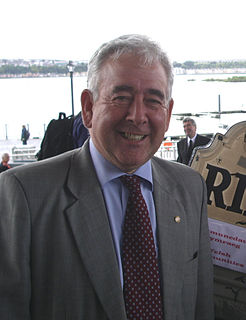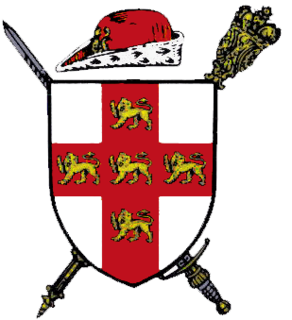Michael Thrasher is a British academic, Professor of Politics in the School of Sociology, Politics & Law at the University of Plymouth. He is also Sky News' election analyst.
Colin Rallings is a British academic, Professor of Politics in the School of Sociology, Politics & Law at the University of Plymouth. Rallings’ first degree was in Politics and Modern History from the University of Manchester. Subsequently, he was awarded a master's degree in Politics by Strathclyde and, in 1979, a Ph.D. by the University of Essex for a thesis on electoral behaviour. He joined the then Plymouth Polytechnic in 1976, being appointed Professor of Politics in 1997. He has held visiting appointments at the University of Leiden, the University of North Carolina at Chapel Hill, the University of Queensland, and the Australian National University, Canberra. He is a member of the Economic and Social Research Council’s (ESRC) panel of assessors for Politics and International Relations, and of the Council’s Research Resources Board.

Dorset County Council is elected every four years by the first past the post system of election. The council currently consists of 46 councillors, representing 40 electoral divisions. The Conservative Party is currently the largest party on the council, having gained overall control in the 2001 local elections. The council meets at County Hall in Dorchester, on the site of Colliton Park adjacent to a Roman Town House.

The 2008 Welsh local elections, were held on 1 May, in 22 local authorities.
Elections to Tower Hamlets London Borough Council were held on 5 May 1994. The whole council was up for election and the Labour party gained overall control of the council from the Liberal Democrats.
Elections to Southwark Council were held in May 1994. The whole council was up for election. Turnout was 36.5%.
Elections to Lambeth London Borough Council were held in May 1994. Turnout was 42.7%.
Elections to Lewisham London Borough Council were held in May 1994. The whole council was up for election.
Elections to Newham London Borough Council were held in May 1994. Turnout was 37.2%.
The Selly Oak local council ward is one of the 40 electoral wards for the City of Birmingham, England. It is also one of the four wards that make up the local council constituency of Selly Oak, the other three being the wards of Billesley, Bournville and Brandwood.
The Weoley local council ward is one of the 40 electoral wards for the City of Birmingham, England. It is also one of the four wards that make up the local council constituency of Birmingham Northfield, the other three being the wards of Northfield, Longbridge and King's Norton.

The 2004 Welsh local elections, were held on 10 June in 22 local authorities, as part of the wider 2004 UK local elections.

The 1999 Welsh local elections, were held on 6 May in 22 local authorities, as part of the wider 1999 UK local elections.

The 1995 Welsh local elections, were held on 4 May in the 22 new local authorities, as part of the wider 1995 UK local elections.

The 1993 Welsh local elections, were held on 6 May in 8 local authorities, as part of the wider 1993 UK local elections.

The first election to Mid Bedfordshire District Council was held on 7 June 1973, with the 49 councillors elected forming a shadow authority until 1 April 1974. Mid Bedfordshire District was formed on 1 April 1974 as part of a general reorganisation of local authorities in England and Wales carried out under the Local Government Act 1972. The district was formed by the amalgamation of five districts:
The 1992 York City Councils elections were held in May 1992 to elect members of York City Council in North Yorkshire, England. Fifteen seats, previously contested in 1988, were up for election: eleven were won by the Labour Party, three by the Conservative Party and one by the Liberal Democrats. The Labour Party retained overall control of the council; the composition of the council after the election was: Labour Party 34 seats, Conservative Party seven seats and Liberal Democrats four seats.
The 2006 Stockport Metropolitan Borough Council election took place on 4 May 2006 to elect members of Stockport Metropolitan Borough Council in England. This was on the same day as other local elections. One third of the council was up for election, with each successful candidate serving a four-year term of office, expiring in 2010. The Liberal Democrats held overall control of the council.
The 2004 Stockport Metropolitan Borough Council election took place on 10 June 2004 to elect members of Stockport Metropolitan Borough Council in England. This was on the same day as other local elections. Due to demographic changes in the Borough since its formation in 1973, and in common with most other English Councils in 2004, boundary changes were implemented in time for these elections. Due to these changes, it was necessary for the whole Council to be re-elected for the first time since 1973. The Liberal Democrats held overall control of the council.







